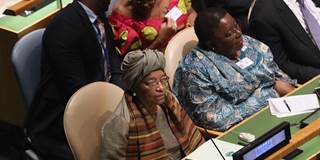
African Women on Top
From limited land rights to the enduring expectation that they perform the majority of unpaid household labor, women in Africa face major economic, legal, and cultural barriers to advancement. But while the barriers to women’s leadership in Africa are formidable, they are not insurmountable.
TORONTO – Africa has a long history of female leadership. Yet leadership can be a challenging aspiration for the continent’s young women, owing to enduring barriers to success. If African countries – and Africa’s women – are to meet their potential, this must change.